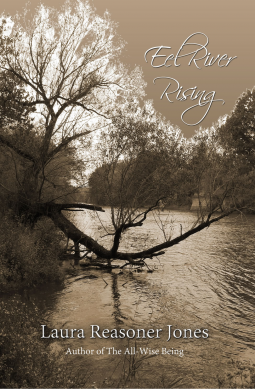
Eel River Rising
by Laura Reasoner Jones
This title was previously available on NetGalley and is now archived.
Send NetGalley books directly to your Kindle or Kindle app
1
To read on a Kindle or Kindle app, please add kindle@netgalley.com as an approved email address to receive files in your Amazon account. Click here for step-by-step instructions.
2
Also find your Kindle email address within your Amazon account, and enter it here.
Pub Date Nov 05 2014 | Archive Date Mar 31 2015
Description
Eel River Rising is a touching and compelling story of love, friendship and choices from Laura Reasoner Jones, author of The All-Wise Being.
In the 1870s, young Flora Meranda is determined to become a doctor like her father, even though she knows her path will be challenging and strewn with obstacles. Flora's story is told through the eyes of her Midwestern friends and family members, women whose lives touch or are touched by Flora and her dream: her cousin Catharine, a Kansas pioneer whose difficult choices of her own lead her little sister Libbet to self-destruct under the weight of her genius; her older sister Macy, whose Civil War romance colors her days into the 20th century; Flora's mother Anna, who strikes out for the wilderness of northern Indiana to make a place for her and her family; Rosa, a young German immigrant who, with Flora, experiences the Midwest's worst natural disaster ever; Kate, mother to a world-famous composer and songwriter, who carefully guards one of the many secrets of Flora's life; Gem, the "college girl" who captures the heart of Flora's son; Luella, the hateful sister-law; Nona, Flora's best friend who steers Flora through town society; Dorothy, Flora's granddaughter who sees Flora for the heroine she is, and Ida, renowned writer and suffragist who uses Flora's story to inspire other women to fight for their rights.
Eel River Rising spans the 19th and 20th centuries, addressing issues facing women both then and today: access to education, marriage and family roles, and equal rights. Disappointments and new directions for each of the women challenge perceptions of the struggle for equal rights and opportunities.
A Note From the Publisher
Keywords: History, Sisters, Midwest, Women's Suffrage, Independence, Pioneer, Flood, Medical College, Friendship
Marketing Plan
Print / eBook
Print / eBook
Available Editions
| EDITION | Ebook |
| ISBN | 9781622877508 |
| PRICE | $7.99 (USD) |
Featured Reviews
 Jennifer S, Reviewer
Jennifer S, Reviewer
A wonderful journey through one woman's life. Laura Reasoner Jones has put together the life of her great-grandmother, Florence Reasoner, through the eyes of those who knew her best. The story is told primarily through correspondence to Flora.
She lived through a pivotal period of American history, from the Civil War to the Great Depression. When her life begins women have very few rights and are dependent on men for their support but she lives to see women gain the right to vote and control their own money and property.
Flora had wanted to be a doctor like her father but she was denied the opportunity to go to college. After her marriage she sets up and operates, in complete secrecy, a clinic for the poor of her city. She teaches English to the immigrants, provides medical services, and instructs mothers in the art of parenting. She is also a worker for the women's right to vote group in her area. Near the end of her life she struggles with the thought that she really didn't do anything with her life. But those around her saw her as a key person in their lives, providing them with encouragement in their own endeavors and an inspiration to continue their education and work to improve their own communities.
I found this story to be both educational and inspiring. Sometimes we take for granted the rights that we now possess and this story really opened my eyes to just how tough the fight to get those rights was. I hope you will also enjoy this book and never forget those who came before us and the work they did.
 Shonna F, Reviewer
Shonna F, Reviewer
This biography is of the women of an earlier generation in the author's family. It begins in the 1860s with Anne Meranda, nee Stiles, telling a little of her background. It is told in letters and in these reminiscences by the various women in the family, and women they associated with. Anna left her family in southern Indiana when she married and her husband, James Meranda, a doctor, opened a practice in Randolph County, in northern Indiana. They lived in the small town of Chili, near the larger town of Peru. Anna had two daughters, Macy and Flora. Macy enjoyed the typical womanly tasks of sewing, keeping house, and playing piano, while Flora expressed an early interest in her father's profession, and with his encouragement aimed herself toward that career. The last entry in the book is from Macy in 1940, looking back and her and her sister's lives.
The real action begins in 1863, when the first letters appear. The majority of the letters are to Flora from others, The few letters from Flora herself are ones never sent, written to those she has lost, from a beloved kitten, to a detested father-in-law.
The men in the family only appear as viewed by women, which gives an interesting, albeit biased insight.
Flora is a woman with drive and skill, and yet sometimes she seems to give up too easily on her dreams. This book has pleasures and tragedies, and gives a real sense of the life of the times. Two big events of 1913 deeply affected Flora. One of these was her trip to Washington to take part in the Women's Suffrage Parade in March. This experience deflated Flora, by the aggression and violence she experienced. The second was the terrible flooding in Peru at Easter, where many people lost the homes and possessions. Flora offered medical care from one of the shelters, and her actions in the community of South Peru to help families, especially mothers and children became widely known.
This is a book of a women's world in a time when women lacked opportunities, rights, and respect. It is a story of lost opportunities, but also of women who found their own path despite their situation.





